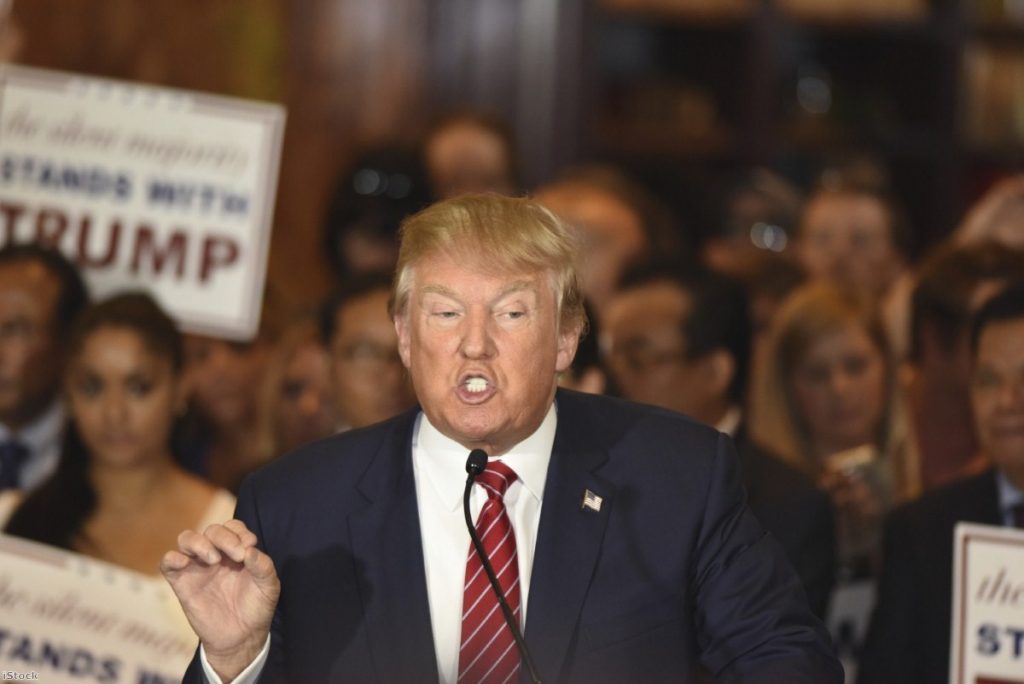By Robin McGhee
As Britain detaches itself from the EU, it will come to rely even harder on its relationship with the US. But from January 20th, the United States will be governed by a radical far-right Republican Party led by a dangerous sociopath. The Republicans are ideologically committed to belligerence, and Donald Trump himself to emulating Vladimir Putin's kleptocracy. If she falls in with them, Theresa May is setting herself up for a bloody four years.
President Trump will be a profound danger to international peace. The danger comes from his being simultaneously belligerent, highly unpredictable, and utterly unfit for the presidency. The evidence of his candidacy shows he acts aggressively and without consulting others on arbitrary whims bearing little relation to evidence or policy. He seems to have a disturbing affinity with dictators and strongmen.
We can only guess at the consequences when Trump becomes commander-in-chief of the American military, supported by a Republican Congress perhaps even more belligerent than he is. He has, for example, said that he wants to “knock the hell out of” ISIS, and not ruled out American boots on the ground. He proposed expanding US and Russian nuclear weapons capabilities, despite their already overwhelming superiority and decades of bilateral disarmament talks. His attempts at diplomacy range from blundering aggression towards China to cringeworthy obeisance towards Vladimir Putin. He is openly racist, supports the use of torture and other mass civil liberties violations, has praised Kim Jong-un, Bashar al-Assad and Saddam Hussein, and has refused to rule out using nuclear weapons against Europe. His attitudes towards Russia, Nato and free trade arrangements are at odds with decades of UK policy. This is the man Theresa May hopes to do business with.



Yet even with Trump in the White House, British foreign policy looks set to be even closer to the US than it has been in the past. Much of British foreign policy since Suez has been little more than picking up some of the crumbs of American power. This has often been for good, but it also had disastrous consequences our reputation, world peace, and the human rights of those harmed by American interventionism.
Now the government is in the process of radically downsizing our relationship with our closest and most natural allies, the European Union. As we abandon our role as a key part of one of the world’s main superpowers, courting the US is the obvious alternative for many on the eurosceptic right, even when Trump is its commander-in-chief. Prominent figures in the Conservative party, such as Boris Johnson, Liam Fox and Michael Gove, are strident supporters of Britain following America's lead in foreign policy.
The evidence from the government's behaviour during the transition shows this is where we are headed. Johnson had previously ridiculed Trump and condemned him as unfit for office; characteristically he abandoned this principled scorn as soon as its object won power. Fox is staking his reputation on free trade deals with the US, even as its incoming president based much of his campaign on criticism of free trade deals. May, meanwhile, firmly congratulated Trump on his election and has arranged to meet him as soon as possible. (Angela Merkel, secure as the leader of a pre-eminent European power, has been far less welcoming of Trump.) May also made an extraordinary attack on the outgoing Obama administration by criticising its language about the Israeli government, a move at odds with previous UK policy and brazenly designed to curry favour with the incoming Trump administration.

There is no need for such brown-nosing. In its 2013 report on US-UK relations, the House of Commons foreign affairs select committee concluded that "there is little historical evidence that taking a different stance to the US, or declining to comply with US preferences on specific issues, damages the UK government's relationship with Washington in any long-term way". Yet the UK government has a habit of supporting the United States on even the nastiest aspects of its foreign policy.
It wasn't just the Iraq War, an action so catastrophic even Donald Trump had to pretend he never supported it. Britain has supported or participated in the Obama administration's intervention in Libya, expansion of American mass surveillance, support for the Saudi regime's invasion of Yemen, and use of drone strikes to execute those even suspected of terrorist involvement. If we supported the worst the Bush and Obama administrations did, why should anyone expect us to suddenly change our minds?
It may be that Trump's campaign rhetoric is just that. Perhaps he will end up being very different in office. But the likelihood is that he will do something very big and very bad, far outstripping the worst actions by the Obama administration. It won't necessarily be a full-on invasion: it could also be a major bombing campaign, a devastating trade war, increased nuclear tension, or support for Russian aggression. Either way, the evidence suggests Britain may end up being dragged into it. We should prepare to campaign against a repeat of British involvement in the Iraq War.
Robin McGhee is a freelance writer working in public affairs in London. He tweets @RobinMcGhee
The opinions in politics.co.uk's Comment and Analysis section are those of the author and are no reflection of the views of the website or its owners.









